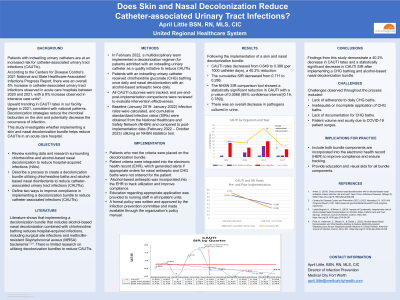Implementation Science and Research
Category: Implementation Science and Research
Poster Theater Session III
ISR 78 - Does Skin and Nasal Decolonization Reduce Catheter-associated Urinary Tract Infections?
Monday, June 3, 2024
12:00 PM - 12:05 PM CST
Location: Digital Poster Theater - APIC Central, Hall 1

Has Audio

April R. Little, BSN, RN, MLS, CIC
Director of Infection Prevention
Medical City Fort Worth
Presenter(s)
Disclosure(s):
April R. Little, BSN, RN, MLS, CIC: No financial relationships to disclose
Background: Patients with indwelling urinary catheters are at an increased risk for catheter-associated urinary tract infections (CAUTIs). Upward trending in CAUTI rates in our facility began in 2021, consistent with national patterns. Decolonization strategies reduce the microbial bioburden on the skin and potentially decrease the occurrence of infection.
This study investigates whether implementing a skin and nasal decolonization bundle helps reduce CAUTIs in an acute care hospital.
Methods: In February 2022, a multidisciplinary team implemented a decolonization regimen for patients admitted with an indwelling urinary catheter as a quality initiative to reduce CAUTIs.
Patients with an indwelling urinary catheter received chlorhexidine gluconate (CHG) bathing once daily and nasal decolonization with an alcohol-based antiseptic twice daily. All CAUTI outcomes were tracked, and pre-and-post implementation comparisons were reviewed to evaluate intervention effectiveness. Baseline (January 2019- January 2022) infection rates were calculated, and cumulative standardized infection ratios (SIRs) were obtained from the National Healthcare and Safety Network (NHSN) and compared to post-implementation data (February 2022 – October 2023) utilizing an NHSN statistics tool.
Results: Following the implementation of a skin and nasal decolonization bundle, CAUTI rates decreased by 40.2% from 0.649 to 0.388 (per 1000 catheter days). The cumulative SIR decreased from 0.711 to 0.286. The NHSN SIR comparison tool showed a statistically significant reduction in CAUTI with a p-value of 0.0068 (95% confidence interval [0.19, 0.789]).
Conclusions: Findings from this study demonstrate a 40.2% decrease in CAUTI rates and a statistically significant decrease in CAUTI SIR after implementing a CHG bathing and alcohol-based nasal decolonization bundle.
Learning Objectives:
- Review existing data and research surrounding chlorhexidine and alcohol-based nasal decolonization to reduce hospital-acquired infections (HAIs).
- Describe a process to create a decolonization bundle utilizing chlorhexidine baths and alcohol-based nasal disinfectants to reduce catheter-associated urinary tract infections (CAUTIs).
- Define two ways to improve compliance in implementing a decolonization bundle to reduce catheter-associated infections (CAUTIs).

